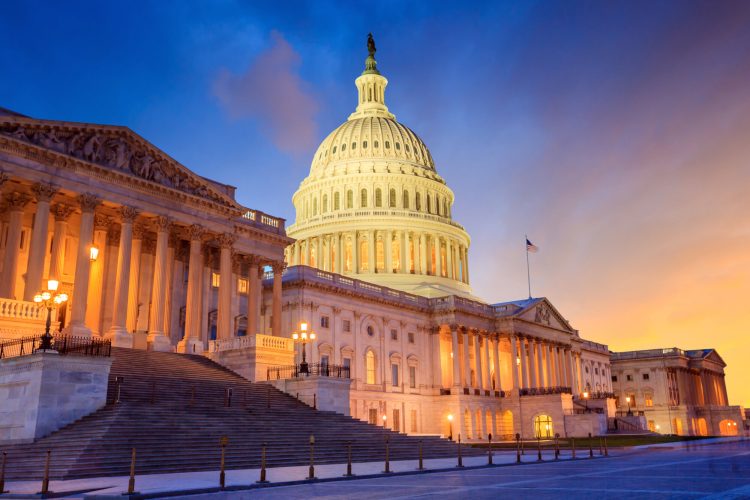This week on Facing the Future, we looked at the state of the economy, including the first quarter GDP report, inflation expectations, the prospects for a “soft landing” as the Fed begins to tighten monetary policy, and whether there are any glimmers of hope for immigration reform.
Our guest was Douglas Holtz-Eakin, President of the American Action Forum and former director of the Congressional Budget Office. Concord Coalition policy director Tori Gorman and chief economist Steve Robinson joined the conversation.
Last week’s report from the U.S. Commerce Department showing that gross domestic product (GDP) contracted by 1.4 percent (annualized) in the first quarter of the year came as a shock. While many economists were expecting a slowdown, they were not expecting an actual contraction. Meanwhile, inflation continued to run hot at 8 percent.
“I was afraid that people would freak out,” Holtz-Eakin said. His prediction had been for growth of about one percent, a low number but still in a positive direction. He explained, however, that when you look inside the report the disappointing growth figure is not as bad as it looks.
Part of the downturn came from an expected slowdown in the restocking of business inventories following the huge build-up in the fourth quarter of last year. A bigger factor was the sharp decline in net exports – we bought a lot more imports than we sold in exports – which Holtz-Eakin characterized as negative in an accounting sense but not necessarily in an economic sense because imports are “a component of producing the best value for our economy.” He also noted that ”the trade data are the hardest to get in real time,” and predicted an upward revision in later reports.
“The right way to think about this report,” Holtz-Eakin said, “is to say, OK, what am I worried about? In the U.S. we’re worried about inflation and an overheated economy. What would households and businesses look like in this report? Well, final sales to domestic purchasers were up 2.6 percent. That’s not a downturn. That’s an economy that’s still growing. Inflation is at 8 percent. So the problems we had on Wednesday before the report are the same problems we had on Thursday after the report and I don’t think we should change course in any way. The Fed should move down its path of tightening and fiscal policy does not need to stimulate the economy or do anything else that might exacerbate inflation.”
Two factors that might prolong elevated inflation are Russia’s invasion of Ukraine, with an effect on food and natural resource prices, and China’s attempt to enforce a zero-COVID policy through lockdowns, with an effect on global supply chains.
Holtz-Eakin said that the COVID situation in China is his ”biggest concern about the outlook for the global economy.” He explained that, “China does not have an effective vaccine. They are forced to try to use complete quarantine as the only way to control the spread of the virus. That will fail, which means we’re going to have a raging epidemic in China and the Chinese economy is going to suffer. That’s a big chunk of the global economy. It means that the near-term headwinds for growth are bigger than anticipated, and it will spill over to the U.S more than people realize.”
Shifting the conversation to monetary policy and the Fed’s attempt to tamp down the inflation spiral without slowing economic activity so much that it causes a recession, Holtz-Eakin warned: “Let me get the bad news out of the way: The Fed has never successfully engineered a soft landing when unemployment has been below 5 percent and inflation has been about 4 percent. We’re there. So the historical odds are stacked against success.”
He predicted that the Fed would be aggressive in raising the Federal Funds Rate to preserve its credibility and prevent higher inflation expectations from taking hold, which could lead to a wage-price spiral.
In keeping interest rates so low for so long, Holtz-Eakin said the Fed “made a mistake and they know it and they’re trying to quickly recover from that mistake and not lose the credibility that has been built up over decades…. They need that and we all benefit from it.”
“The great lesson of inflation,” he concluded, “is that central bankers hate the idea of entrenched inflation because once it’s entrenched there are no good choices. They’re picking among which bad outcome do we get.”
Hear more on Facing the Future. I host the program each week on WKXL in Concord N.H., and it is also available via podcast. Join me and my guests as we discuss issues relating to national fiscal policy with budget experts, industry leaders, and elected officials. Past broadcasts are available here. You can subscribe to the podcast on Spotify, Pandora, iTunes, Google Podcasts, Stitcher, or with an RSS feed. Follow Facing the Future on Facebook, and watch videos from past episodes on The Concord Coalition YouTube channel.
Continue Reading










